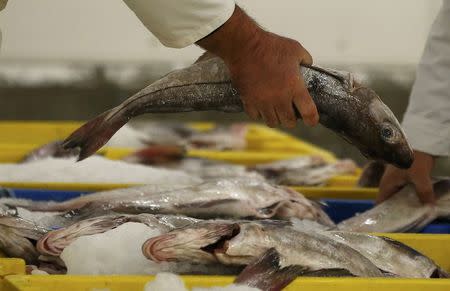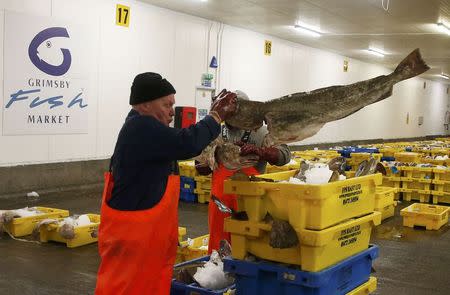Better in or out? England's former fishing hub faces EU dilemma
By Estelle Shirbon GRIMSBY, England (Reuters) - The European Union is not an abstract concept in Grimsby, an English port where many blame EU fishing quotas for destroying livelihoods, but views on whether Britain should quit the club are more nuanced than the decaying fish docks suggest. Located on the estuary of the river Humber on England's northeastern coast, Grimsby was home to a fleet of some 600 trawlers in its 1950s heyday, but now there are hardly any left and the town struggles with a legacy of poverty and unemployment. The decline dates back to the 1970s, when Iceland, concerned by overfishing, closed its cod-rich waters to foreign vessels and the EU began setting quotas to preserve stocks in waters shared by Britain and other member states. "It killed the town," said Dennis Avery, 73, former skipper of the Ross Tiger, a fishing trawler that is now a museum ship. He now leads tours of the vessel, his weather-beaten face and tales of shipwreck bearing witness to vanished glory days. In some ways, Grimsby epitomises the malaise of many ailing British coastal towns, where a large number of people feel left behind by the globalisation of the economy and long for Britain to have more control over its own destiny. These are places where eurosceptic sentiment runs high. In Britain's general election in May, the anti-EU party UKIP increased its share of the vote in Grimsby to 25 percent, from 6 percent in 2010. "UKIP are speaking for a lot of people," said Avery, who will vote for Britain to leave the bloc in a referendum promised by Prime Minister David Cameron for before the end of 2017. But many of those still making a living from the sea fear the uncertainty that would come from quitting the club. Andrew Allard's seven-vessel Jubilee Fishing Company is a rare success story. He is no great fan of the EU Common Fisheries Policy, but after decades operating with it he wants to know what would replace it should Britain go it alone. "Would it affect my investment in quota?" he asked, referring to money spent on boats with allocated fishing quotas. WIND OF CHANGE It is unlikely there will be a precise answer to that question before the referendum. Cameron is trying to renegotiate the terms of Britain's EU membership ahead of the vote, but only the outlines of his demands are known. There is scant detail about the nitty gritty of what "Brexit" would entail. "I'm not even sure seafood features on Cameron's list of priorities," said Steve Norton, chief executive of the Grimsby Fish Merchants Association. The fish docks are a strange place, scarred by the collapse of fishing but also showing the resilience of fish processing and the promise of new opportunities in offshore wind energy. A vast ice factory that closed down in 1990 lies abandoned, its ceiling collapsed and its Victorian brickwork crumbling. Nearby streets once crowded with fishermen are largely derelict, with just a few small businesses left amid boarded-up windows. But there is also a modern fish market where 15,000 tonnes of fish are auctioned per year, roughly 80 percent of it from Iceland or Norway, 10 percent local and the rest from elsewhere. Early every morning, fish merchants and processors huddle around piles of plastic boxes full of fish, calling out bids to auctioneers who record the results in little black notebooks. Chief Executive Martin Boyers said EU issues are not vital to the market because Iceland and Norway are not in the bloc. "There's as much fish available, it's just not our fishermen catching it," he said on the sidelines of the daily auction. Dotted around the docks are logistics bases for offshore wind energy firms. The growing sector has brought new hope to Grimsby, and a more positive perspective on ties with Europe. Denmark's DONG Energy operates two wind farms off the coast and plans to build two more. It says it will invest 6 billion pounds in the Humber region from 2013 to 2019 and could create up to 500 long-term jobs from 2020 onwards. Campaigners in favour of staying in the EU say one of the risks of leaving is the potential impact on foreign direct investment. A spokesman for DONG said the company had taken no public position on Britain's EU referendum. THE FUTURE OF FISH At one of DONG's offices, an airy block built on a former dumping ground for fishing nets, British and Danish staff are developing a 91-turbine wind farm called Race Bank. Their navy blue T-shirts are emblazoned with the DONG logo, the flags of Britain and Denmark and the slogan "Together We Build". Project Manager Jason Ledden said wind energy was already providing work to a range of local professionals, from engineers to hoteliers, from administrative staff to skippers of boats providing key support services to the offshore teams. Allard's Jubilee Fishing is one local company that has diversified into services to the sector. On a recent morning, one of its boats was out with a team surveying bird flight paths in an area where wind turbines are due to be built. For now, fish processing remains key. Industry bodies say the sector is worth an annual 2.5 billion pounds to the Humber region, and Grimsby companies handle 70 percent of Britain's chilled seafood. In a modern industrial back street is Flatfish, a family-owned business with an annual turnover of over 12 million pounds and a state-of-the-art factory that employs a core staff of 60, rising to 120 in the high season for flat fish species. After a thorough sterilisation process, workers provide handprints to gain access to the highly secure factory. Inside are machines that can process over 17,000 fillets per hour. Flatfish gets most of its supplies from British fishermen, in Grimsby and around the country, agreeing prices and requirements such as mesh sizes to get exactly what it wants. Managing Director Steve Stansfield has not found EU quotas to be a problem. A key species for Flatfish is North Sea plaice, for which the total annual quota is "enormous", he said. "We have a fantastic fishery on our doorstep so let's get behind it," said Stansfield, who was upbeat about growth opportunities for those prepared to re-invest in fishing. (Editing by Richard Balmforth)

 Yahoo News
Yahoo News 








